One of the biggest factors that you need to consider when launching a new website is the cost of web hosting. Depending on your needs, the cost of hosting can vary, starting from just around a hundred dollars, and going all the way up in the thousands.
The hosting you choose is an incredibly important factor because it’s going to directly affect the performance of your site. If you choose cheaper hosting on a shared server, you can expect lower loading times.
This could ultimately impact your website’s rankings, especially because Google and other search engines pay close attention to how quickly your website loads up. In order to set up a basic website, all you need is a domain name, a cheap hosting plan, and some content.
Anything else is additional, and you can get those options depending on your needs. There’s no shortage of hosting providers out there, so it’s fairly easy to find affordable hosting. But, before we get started, it’s important to understand the basics.
What is Website Hosting?
Every website on the internet is “hosted” on a remote computer. Essentially, each website has a bunch of files that are placed on a computer hard drive. This remote computer is known as a server.
So, when you pay for hosting, you are essentially leasing a portion of the space available on the server’s hard drive. Because servers are essentially computers, the specifications usually vary. More powerful servers, with greater RAM and increased CPU bandwidth often cost more.
That is why most hosting companies offer different hosting plans, usually divided into separate tiers. They vary in functionality and pricing, allowing you to choose one that best fits your needs. So, if you are interested in launching a website, you will have to pay to host it somewhere.
Types of Hosting Plans
Before we really delve into the costs of hosting, let’s just recap some of the most common types of hosting, in order of pricing:
Shared Hosting ($2-$20/mo)
This is the cheapest option. If you choose shared hosting, your website is hosted with several others on a shared server. In case there’s a traffic spike on one of the websites or a malware infection, it’s going to affect all websites hosted on the server.
Virtual Private Server (VPS) Hosting ($20-$75+/mo)
If you don’t want to share a hosting environment, and want dedicated resources, you should choose this option. Physical servers can generally host multiple virtual private servers, but the resources are locked for each website.
Ecommerce Hosting ($29-$300+/mo)
If you are running an ecommerce website, you will need to choose ecommerce hosting. This type of hosting is designed primarily for online stores, and allows you to set up ecommerce plugins like WooCommerce quickly and efficiently.
WordPress Hosting ($5-$1k+/mo)
WordPress is the world’s most popular content management system. If you want to launch a website powered by WordPress, you need to choose WordPress hosting. Many hosting providers offer dedicated perks including access to free plugins and themes.
Dedicated Server ($75-$400+/mo)
This is the most expensive option on the list. If you choose dedicated hosting, you essentially lease out an entire server.
Cloud Hosting ($5-$500+/mo)
Cloud hosting is slightly different. Essentially, the cloud runs all web hosting services simultaneously, including FTP, SFTP, and SSH. This offers greater reliability, and more importantly, scalability.
The Costs of Hosting
The costs of hosting a website can be divided into several steps. In the following paragraphs, we shall break down the costs of hosting, starting with domain registration.
Registering a Domain
Your domain is the root address of your website. Before you host a website, you need to invest in a domain. Certain platforms that offer free hosting usually offer a free subdomain that you can use. For instance, it could be myblog.wordpress.com.
Naturally, you can’t expect your website to rank high with a subdomain. It looks highly unprofessional, especially if you are planning to start an ecommerce store.
So, before you think about buying hosting, you need to register a domain. To do that, you need to find a domain registrar. The TLD (top-level domain) you use also impacts pricing. More popular and common names with a .com usually sell for a higher price.
Ideally, the URL should be the same as your business name. Keep in mind that when you register a domain, you pay for a year of ownership. Every year, you will have to renew the registration as well. Generally, it’s the same amount you pay each year.
How Much Does Website Hosting Cost? A Deep Dive
The cost of buying a domain is independent from the cost of hosting, in a way. But, without a domain name, there’s no point in buying hosting. You can always buy a domain name from a different registrar, and purchase hosting from another web host altogether.
An important factor you need to consider is the rise of hosted platforms. Hosted platforms like Shopify allow you to buy hosting and build your website using a simple drag and drop website builder. Basic Shopify pricing starts from $29/mo, with no setup fees. Shopify also allows you to connect a domain name you already own, or buy one through the platform.
Shared Hosting

When you choose shared hosting, you are essentially renting space on a shared server with other websites. The prices are generally cheap because of the higher competition.
In fact, entry-level pricing starts from just around $3/mo for shared hosting plans. Renewals usually cost around 40% more than what you originally paid. In most cases, the lower pricing is only valid if you purchase a plan with a longer duration.
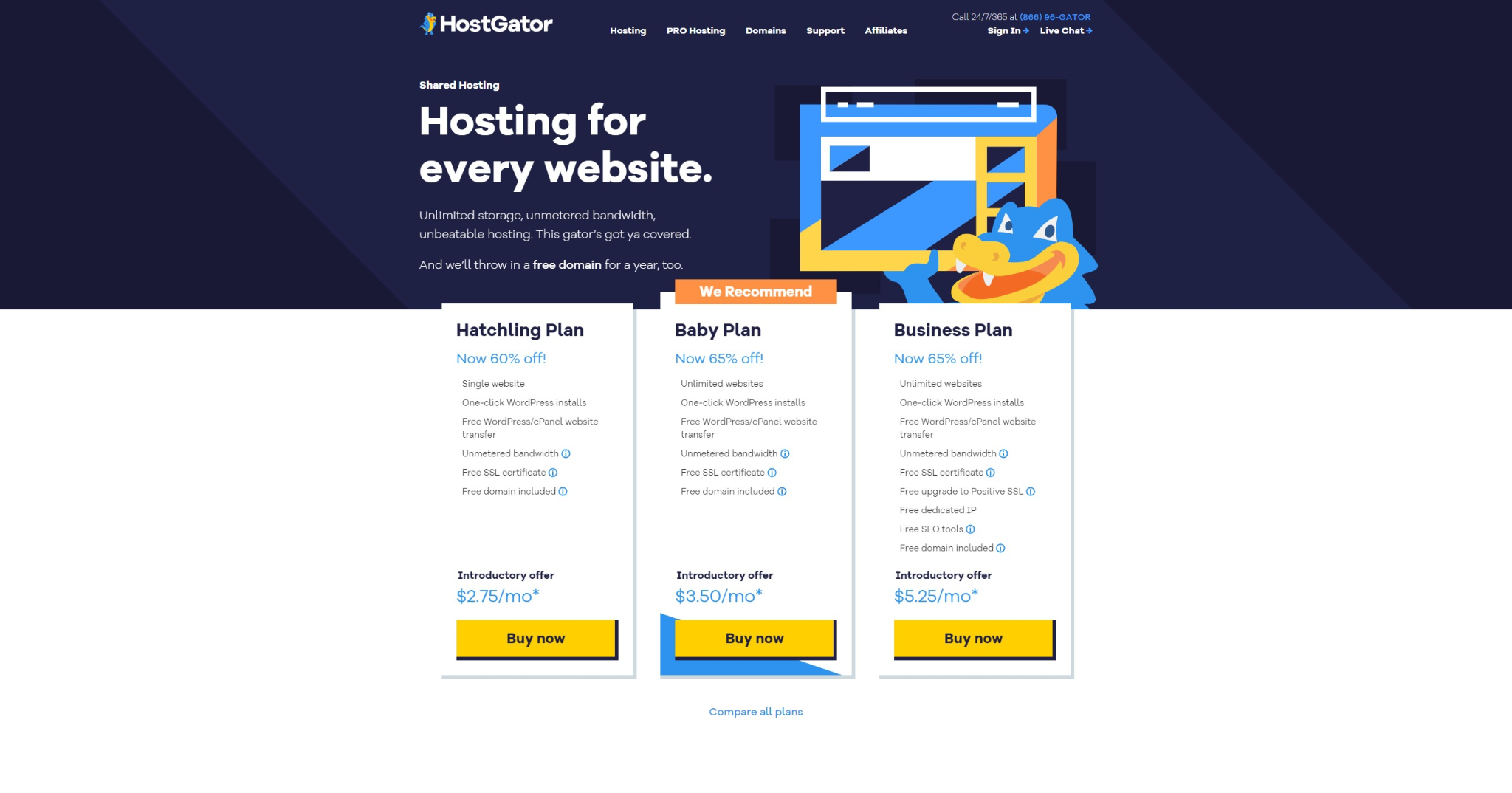
As you can see, this is an “introductory” offer made available at a considerable discount. Most hosting providers only allow you to host one website on a server. It’s important to note that the signup plans are just designed to reel customers in. Shared hosting is generally good for:
- Blogging
- Smaller websites with limited traffic
VPS Hosting

Entry-level VPS hosting costs start from around $20, and tend to vary depending upon the specifications of the server. VPS hosting costs more than shared hosting because it gives you a simulated environment where you can host your own server.
Essentially, it gives you all of the flexibility that you would expect from a dedicated server. But, just like a physical server, limitations are imposed, including storage, RAM, and processing power.
Since the servers are hosted in an isolated environment, the performance is much better. More importantly, VPS hosting providers also grant root access to servers, and allow clients to select whichever control panel they would want to use.
The issue, however, is the accuracy of specifications. If you do not configure the server properly, it could cause you a lot of trouble. Bluehost is one of the biggest hosting companies, and they offer VPS hosting tailored for small businesses and individuals. Here are their VPS hosting plans:
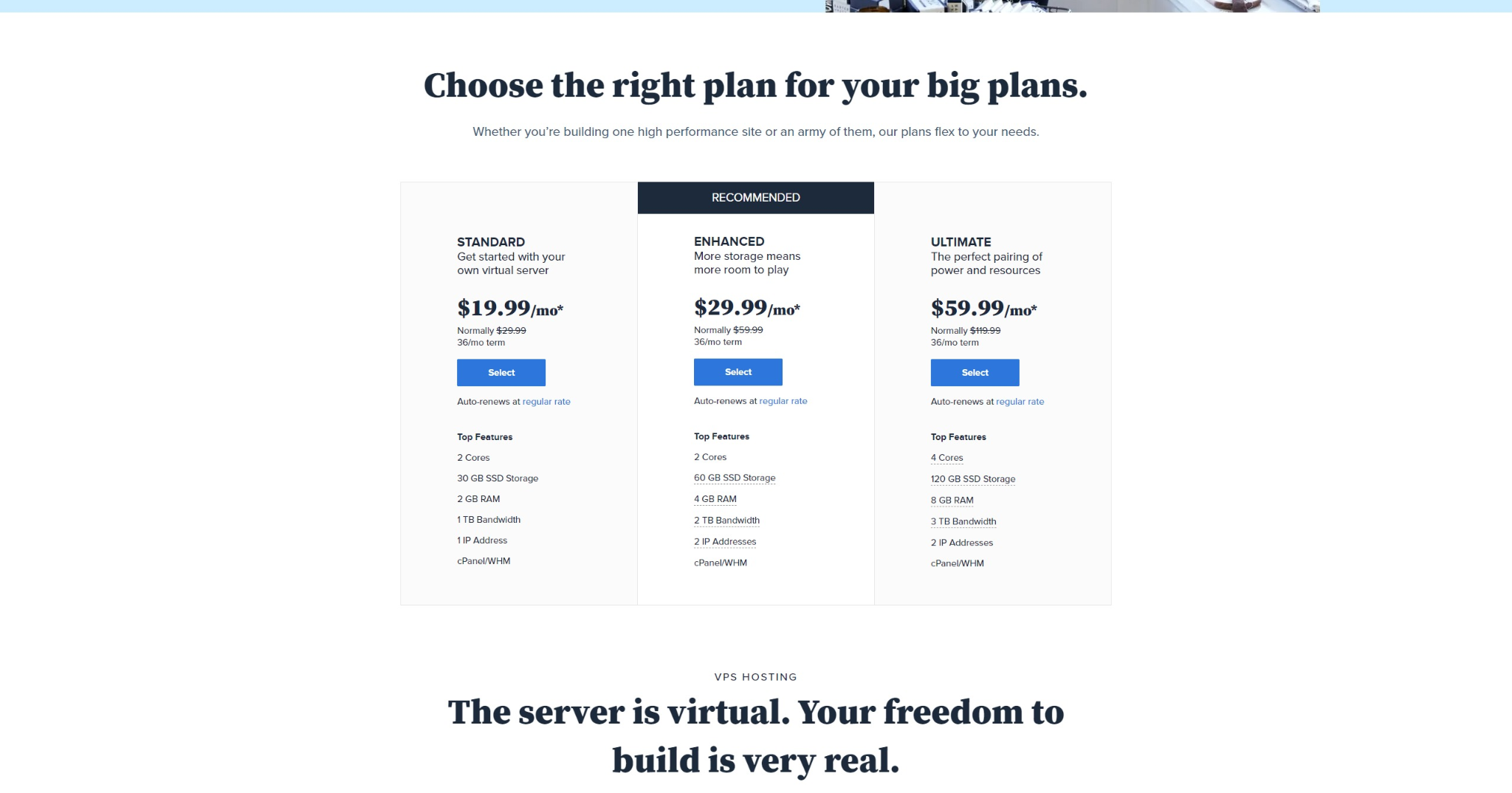
VPS hosting is ideal for:
- Programmers
- Growing companies that need something better than shared hosting
- SaaS businesses
Ecommerce Hosting
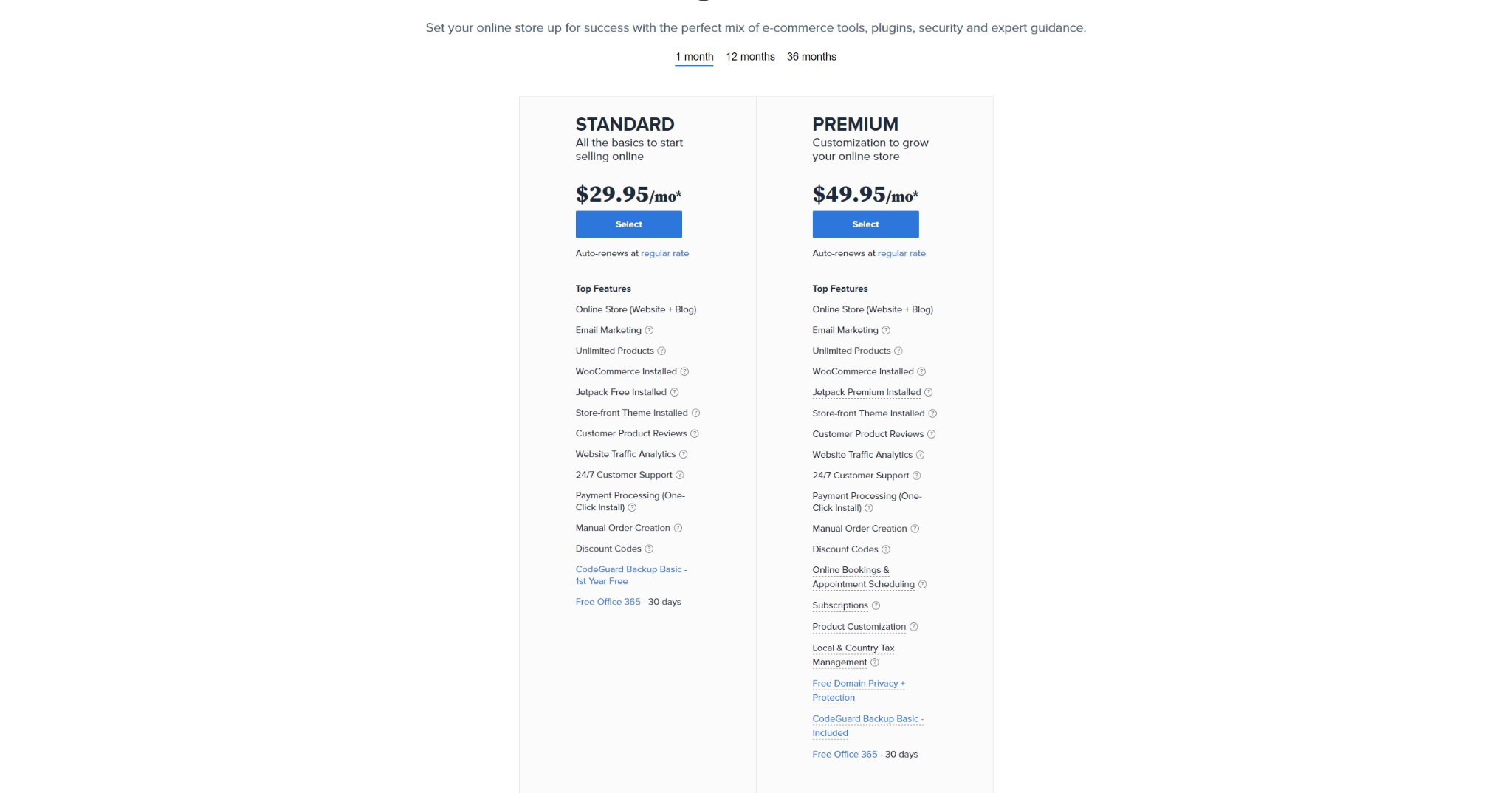
If you are going to launch an ecommerce store, you should choose an ecommerce hosting plan. These hosting packages give you all of the essential things you need to launch an online store. For instance, the plans above are offered by Bluehost, and provide WooCommerce hosting.
A free SSL certificate is included, and these plans provide 99.9% uptime, which is what you need for your store. There are plenty of web hosting providers that provide ecommerce hosting. Many also offer multiple hosting options, such as WooCommerce hosting, Prestashop hosting, Joomla hosting, or others.
If you want to go the hosted route, you have other cost-effective options, such as Shopify, BigCommerce, or Wix. We also have a limited time promotion for Shopify, where you get a 14-day free trial and pay only $1 for your first month.
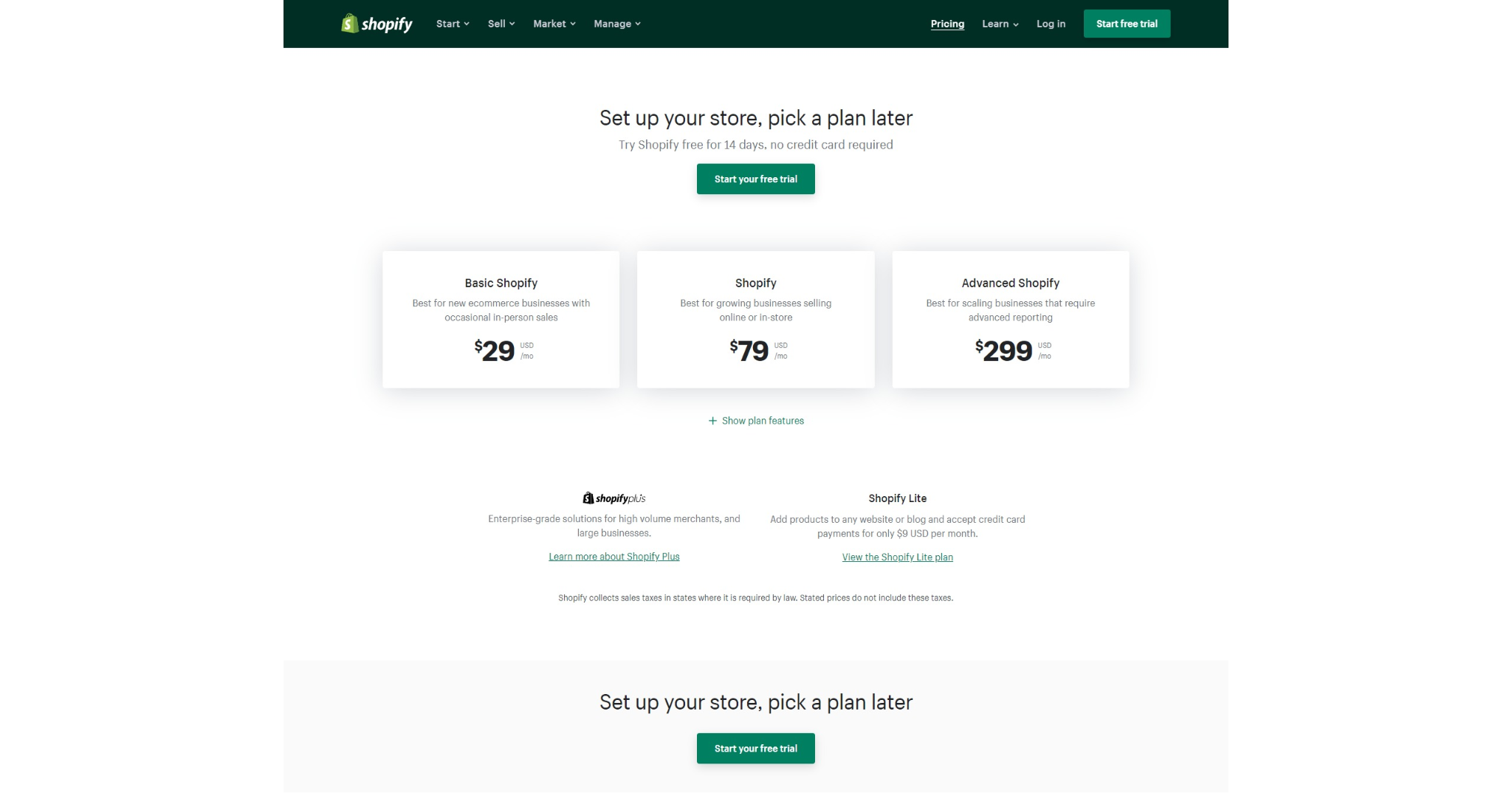
When you choose a hosted platform, you get hosting, a website builder, and a series of tools fpr search engine optimization and to manage your store. In some cases, you might be eligible for a free domain as well. If you want to launch an online store and don’t want to worry about tinkering with servers, go with a hosted platform.
However, if you want greater control, go with a self-hosted solution. As you can see, Basic Shopify costs $29.99/mo, but it offers you a lot more than just hosting. This type of hosting is best for:
- Online stores
- Digital service providers
- Not-for-profit organizations that wish to process donations on site
Companies like Shopify allow you to choose from tons of pre-designed templates and add-ons to create a website that best serves your needs. Or, you can use their website builder to come up with your own web design. Of course, there are plenty of tutorials on the platform, and a dedicated support team in case you need to ask a few questions.
WordPress Hosting
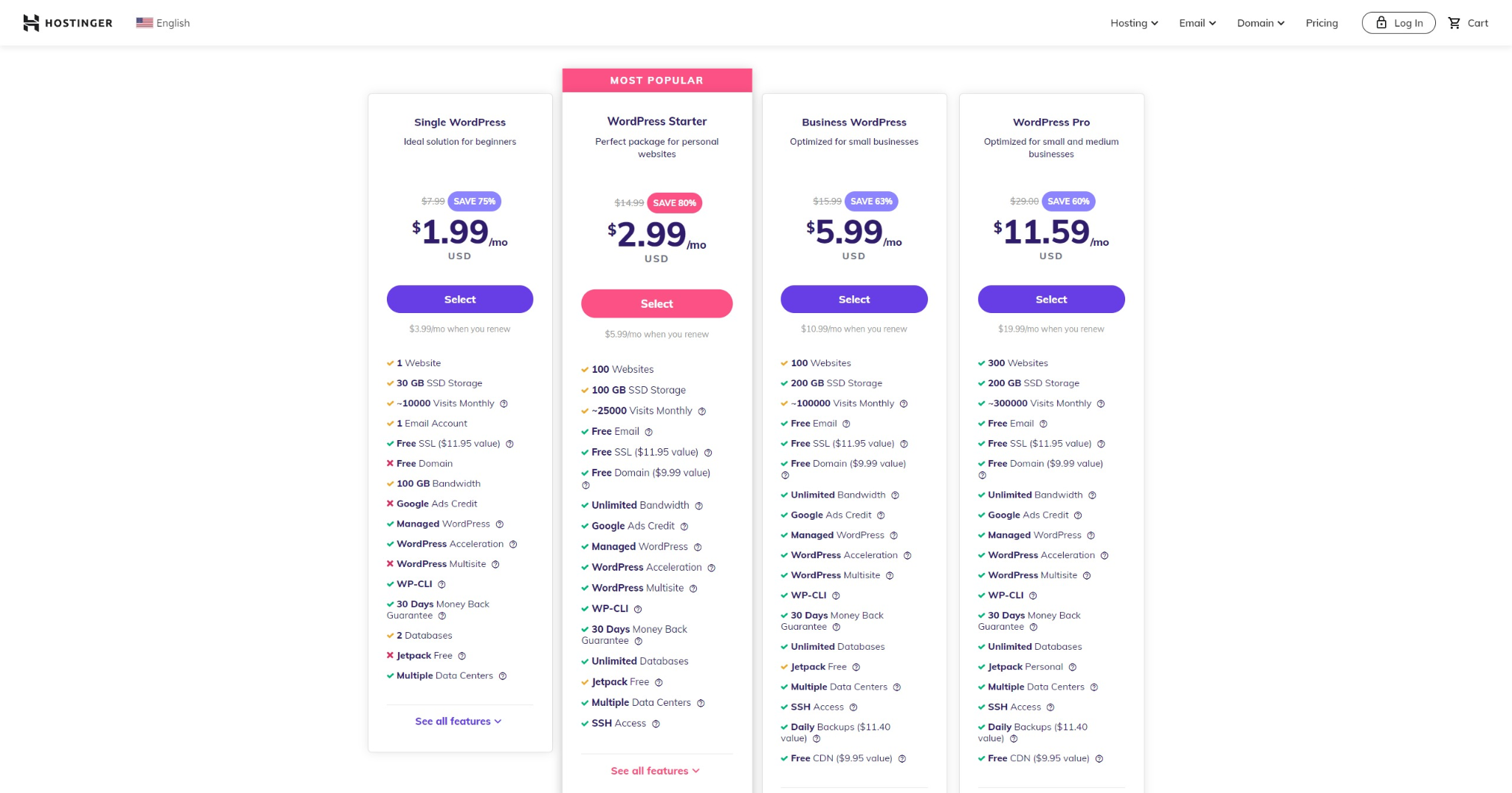
WordPress hosting is generally offered by all the major hosting providers. The image above highlights the WordPress hosting plans offered by Hostinger, a popular company. However, many people tend to get confused between vanilla WP hosting and managed WordPress hosting.
What is Managed WordPress Hosting?
Managed WordPress hosting is just like conventional shared WP hosting, except companies usually add a bunch of tweaks to improve performance. You also get additional services such as regular backups, optimization, and tools designed to create and manage staging sites.
All of this translates to faster performance. For instance, the plans above from Hostinger are for basic WordPress hosting. Managed WordPress hosting from Bluehost starts from $9.95/mo, as shown below.

Depending upon the needs of your own website, you need to be careful about the hosting package you choose. Ideally, managed WordPress hosting would be suitable if you need a custom dashboard to track and manage tasks, like adding or removing plugins. It’s great for:
- Websites using WordPress as their CMS
- Growing businesses
Dedicated Server Hosting
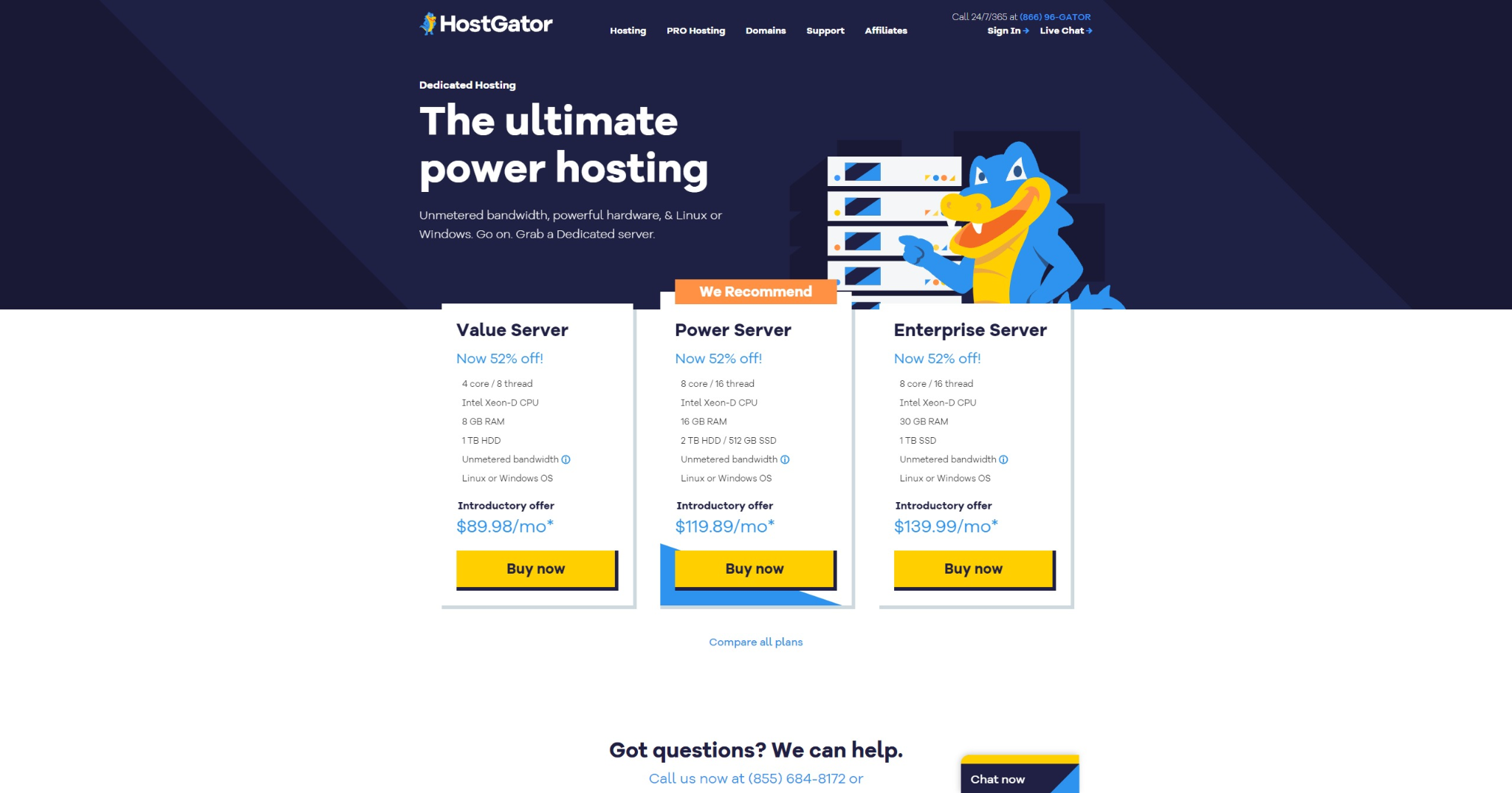
Dedicated server hosting is designed for growing businesses who want more than just a simple webpage. The screenshot above, from HostGator, shows their dedicated hosting plans. Business owners with a huge website, including several landing pages, and lots of content, will want to choose dedicated hosting.
As you can see, dedicated hosting is advertised in a slightly different way; providers generally highlight the specifications of their servers. Essentially, you get an entire server to host your website on.
This is ideal for a startup or a company about to launch their own SaaS tool. These plans are generally suitable for people with some technical know how. If you are getting lots of traffic, upgrading from a shared web hosting plan to a dedicated server makes sense.
You can also use your own control panel such as cPanel or any other. Customer support, as you can imagine, is also significantly better than if you went with a shared hosting plan. Dedicated server hosting is great for:
- Websites attracting high traffic levels
- Webmasters who want stability
- Businesses that want greater performance than VPS hosting has to offer.
Cloud Hosting
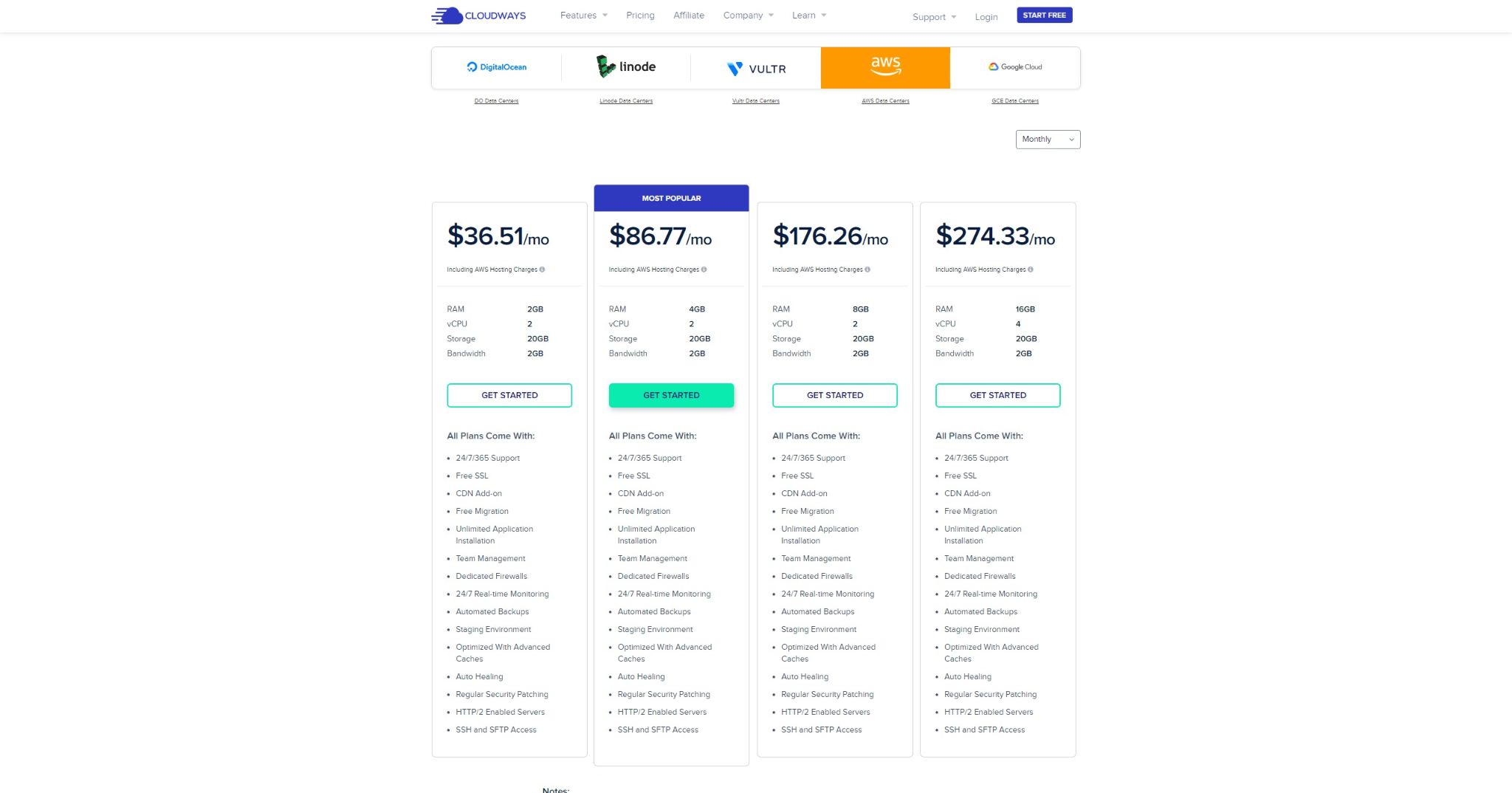
If you want to avoid downtime altogether and want the best hosting option out there, go with cloud hosting. Web hosting companies that offer cloud hosting solutions generally don’t charge a lot either. In fact, many, such as InMotion, also offer a money-back guarantee!
Of course, there are several variables to consider. As you can see above, the cost varies depending upon which provider you choose. In the screenshot, Amazon Web Services is selected, which is why the cost is higher. If you choose DigitalOcean, the cost will decrease.
Cloud hosting is better for several reasons. First of all, it distributes your risk, so the chances of downtime are significantly low. Cloud servers seldom go down, and the speeds are also faster. Cloud hosting is great for:
- Organizations that want almost perfect uptime
- Growing businesses
- SaaS companies
- Digital agencies
- eCommerce stores
Additional Costs
The costs you pay upfront for hosting mentioned above are not final. In most cases, you’ll have to pay more than this. We have already covered domain registration costs, which typically run you around $15 a year at most.
You can buy a domain from a registrar such as GoDaddy, and then choose any hosting provider. However, getting a domain is just one additional cost you’ll have to incur. Here are a few others.
SSL Certificate(s)
SSL stands for Secure Sockets Layer. A SSL certificate can be bought usually from your web host, or you can purchase it from a third-party provider. SSL certificates move your website from HTTP to HTTPS.
It’s the padlock shown beside the website’s URL in the address bar. SSL certificates protect your data when it’s being moved between servers. It also protects sensitive information on the site, including usernames, passwords, or even credit card information.
Websites that don’t have a SSL certificate are untrustworthy, and most browsers usually give users a warning that the website might not be safe. As a result, it’s going to cost you valuable traffic.
There are three kinds of SSL certificates, including extended validation (EV), domain validation (DV), and organization validated (OV). Depending upon the nature of your website, you need to select the right one for your needs.
Most web hosting companies like SiteGround generally offer SSL certificates for free. You can also get a free SSL certificate from Let’s Encrypt, if you have a bit of technical knowledge.
Domain Privacy
If you don’t want people knowing who the domain is registered to, you might want to choose domain privacy as an option. It generally doesn’t cost much – average costs are between $10-$15 a year, but it will keep your domain name safe and protected.
Dedicated IP Address
A dedicated IP address might be needed if you are using a private SSL certificate. Similarly, if you want to access the webpage via FTP by IP instead of using the conventional domain name, you will have to invest in a dedicated IP address. Again, prices generally vary, usually starting from $50 to $100.
Backups
Most web hosting providers offer automatic site backups for free. However, there are a few companies that charge a minimal fee for this. It’s not much, usually between $2 to $5 a month, but it’s still something that you need to factor in.
Of course, if you have a bit of technical expertise and understand web servers in general, you could back up your site yourself. Companies that generally don’t charge a fee to back up your data usually do charge one for restoring your backups in case your website crashes and the data is lost.
Increased Traffic
Most web hosting providers will charge you an increased fee if the amount of traffic on your site increases. For instance, if you are using a shared plan, an increase in traffic could affect other websites, and as a result, you might have to pay an “overage” charge.
Web hosting companies are generally quick to inform clients of a traffic spike, and request you to upgrade to a more accommodating plan. If you don’t, you might pay a fee for the increased traffic.
Email Hosting
If you want a professional email address to go along with your domain, you will need email hosting. Some companies, like GoDaddy, throw in a professional email at no extra charge if you buy hosting from them.
Others require you to pay a fee, which is generally between $2-$4 per month. You can also choose free email hosting, such as the one offered by Zoho Mail.
Website Security
Security is a serious concern, and should be one of your top priorities. Ideally, you’d want to choose a robust security option, such as SiteLock. You will want DDoS protection for your site as well, which is offered by all major website security providers.
Some of the biggest names in the website security industry include:
- Cloudflare
- SiteLock
- Sucuri
There are a few companies that bundle website security solutions, but you’d generally want to go with another. Other services, like UpTimeRobot, also cost money, and monitor your website to ensure optimal performance.
Apart from these, you will also have to worry about the website design. Buying hosting for your site is just the first step. Once you do that, you will want to install a CMS, and then start with the design.
You can use a website builder like Elementor or Oxygen to get started. Choose from thousands of templates or design the website yourself, and then you can take it live. Ideally, as a beginner, you will want to choose shared hosting for your site.
As you start getting more and more traffic, you can eventually make the switch to a better hosting plan and work your way up.
Key Factors To Consider When Selecting a Hosting Provider
It’s not worth it to choose a web host without doing careful research on your own. In almost every case, you need to evaluate a few other important factors apart from money before choosing a web hosting provider.
Uptime
Reliability should be one of your primary requirements when looking for a web hosting provider. For every minute that your website is down, you could be losing thousands in revenue. This is especially true for ecommerce stores.
There have been plenty of cases where ecommerce stores have gone down due to a spike in traffic. For instance, as Black Friday approaches, many store owners start beefing up their hosting packages.
You don’t want to stick with a hosting company that costs you crucial revenue. When Amazon went down for a mere half hour in 2013, they lost more than $65,000 in revenue. You really don’t want to suffer the same fate.
Therefore, when evaluating different hosting providers, start by checking their uptime percentages. Ideally, the host you choose should provide 99.95% uptime. If you can find a web hosting company that offers 99.99% uptimes, go with that.
Reviews
Don’t just believe the marketing done by the web hosting provider. You need to go through reviews left by other customers and then decide for yourself. The good thing here is that there’s no shortage of information.
You can easily find information in Facebook Groups, Reddit, and a bunch of private forums dedicated to hosting. If you know someone who has a website hosted with a company, do ask about their experience before you sign up.
Scalability
The ability to downgrade or upgrade your server as you see fit is incredibly important. If you start off with a shared hosting plan, it’s likely that you will want to upgrade some time in the future.
As your website’s demands increase, you will want to move to a bigger server with greater resources. Does the hosting provider make it easy for you to upgrade easily? Scalability is a key factor that you need to take into account.
You should be able to scale up or down easily. This will prevent you from the hassle of migrating to a new host altogether.
Renewal Costs
It’s common practice throughout the hosting industry to charge a significantly higher renewal fee. The price that you pay when you sign up to a hosting provider is not the same price you’ll be charged when your plan expires.
When comparing different hosting companies, choose one that doesn’t make an outrageous price jump. For instance, if you are paying $4/mo for hosting, the renewal price should be more than $8/mo.
It might be a wise idea to check out the company’s “Terms and Conditions” page to get a better understanding of their renewal policy.
Free Trial
Reviews are one thing, but trying out a hosting company yourself is perhaps the best way to determine if they are good for you or not. You can see if the company has a free trial on offer.
Most companies do offer one, though they might require you to enter your credit card details. Trying out the hosting service yourself is the best way to check if it’s good for you or not.
Ideally, you want your website to load in under 1-2 seconds. Optimize the site during your free trial, and see if the page speed is up to the mark. It’s a critical component of the Core Web Vitals.
Access to FTP or .htaccess File
In some cases, you might require access to the .htaccess file. Similarly, if you have to move files in batches, getting FTP access on the server is equally important. This might not be high up on your list when you are just starting out, but it’s definitely something to consider as you scale.
Customer Support
This is perhaps the most important thing to evaluate. Customer support should be your biggest priority. You don’t want to be stuck on the phone when your website goes down or if you encounter a problem with the server.
Ideally, you should go with a hosting company that offers essential support solutions, including live chat, telephone, and of course, a ticketing system. Some companies also have dedicated support staff monitoring their Facebook and Twitter, so you can reach out to them on those platforms too.
Timely support is critical when selecting a hosting provider. For a majority of website owners, poor support is often a dealbreaker. You really don’t want to wait hours to get a response from your hosting provider, especially during those crunch periods.
This article is written primarily from the point of view that cost is the most important factor that the client is considering, but sometimes what might seem like a good way to save money isn't really going to work. Obviously the cost can vary wildly between different design studios, and every clients has different needs, so the information presented here is not going to be very precise, but will serve as a general comparison of what the base cost of website development and the cost of website hosting and maintenance is likely to be.
It’s Not Just About The Hosting Costs
As you can see, there’s a lot more you need to consider when selecting a hosting provider than just looking at the costs. A fast and responsive website will ultimately help with SEO rankings, and lead to an increase in traffic.
Obviously, the cost of hosting is going to be a top priority, but the buck doesn’t stop there. Selecting the cheapest host is not always the best solution, so it’s important to take other factors into account as well.
However, if you wanted the bottom line, this post covers the differences in costs depending upon the type of hosting you choose, and the hosting provider you opt for.
So with all that firmly in mind, we can proceed with some idea of the client's needs and external production costs before getting down to the business of
1. Totally custom website
This is the preferred and most expensive way to build a website. It may or may not be built on a CMS framework, but it's going to be totally original and will have absolute flexibility. If you can imagine it, you can do it, and there are no restraints. The downside is that clients may have difficulty self-managing such a site, and may become dependent on the developers to make updates to their site.

Developers will have to write site-unique HTML and CSS instructions, possibly also custom programming in JavaScript and PHP, and create the entire site architecture. Third party components will probably be used, and may require licensing fees which could add slightly to the development cost (and in some cases, could add significantly to the cost). These can't be taken into account for this analysis because they're not generic enough.
Testing costs for fully bespoke sites are also likely to be higher because there are more things that need to be tested, and it's not being built on top of something that has already been created and widely used.
Of course the true benefit is obvious, because the site will be totally unique, will work exactly the way you want it to, and you can include or exclude anything you want. There won't be any hidden annoyances or resource hogs, because the code can be fully optimized to meet the unique needs of the site, which isn't usually possible with the other development methods.
Breakdown:
Time to completion 7 days to 90 days
Design fees $300 to $3,000
Programming costs $500 to $6,000
Hosting & Registration $150 to $450
Sub-Total $950 to $9,450
Total $2,175 to $15,200
2. Managed WordPress Site
This differs slightly from a normally hosted website because you have access to way less features than what you get with regular hosting. Of course with regular hosting you can run a WordPress.com site anyway, which makes it all the more curious that these WP-specific sites have become so popular, but that's the way of things.
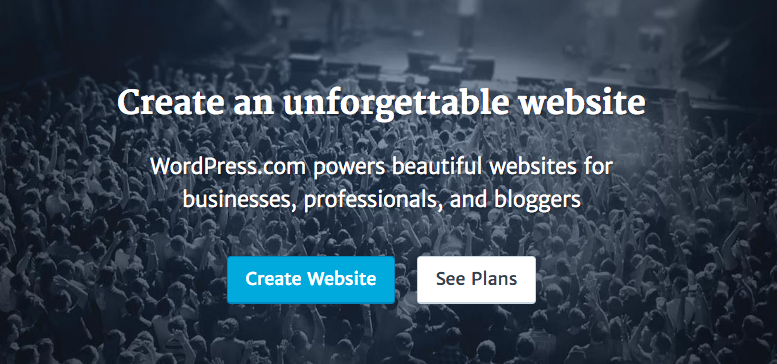
WordPress, in common with many other CMS programs (with the exception of ModX), does impose some restrictions on what you're free to do, and introduces additional complexity into the development process, depending on exactly how far off the original template you intend to stray.
Theoretically, a WordPress site should cost less because it is not built from scratch. Instead a template is used, which may have previously been used to create thousands of other similar websites, and the developer simply modifies this template to include your unique content. In practice, not everyone will pass along the savings that you'd be entitled to expect. For the purpose of this analysis, we'll assume the developer is passing on the savings to the client.
The advantages offered by a WordPress site include:
- Normally faster development time
- Normally easier for clients to self-manage
- Access to a huge array of plug-ins that can help automate certain tasks
- Large user base means plenty of resources available for learning and assistance
There are, however, some disadvantages that clients should be aware of as well:
- Increased security risk – WP sites are a hacker magnet, with a long history of vulnerabilities
- Tendency of creating “Stepford Sites”, where they all look somewhat the same as each other
- Clients may be unaware of advanced features or how to activate them
- The many plug-ins are nice, but they are not always well-coded, and may lead to site bloat
- It is much too easy for clients to accidentally erase entire sections of their site
- Despite what fans of WP will tell you, this CMS is one of the most limiting you can use
The last factor is not an issue for the vast majority of sites, which is one reason why there are so many fans of WP. But if you're part of that minority that does need to be able to do very advanced things with your site, you'll soon resent some of the limitations imposed on you by the CMS. Of course WordPress is not unique in this regard, as many other CMS varieties also impose constraints, but it is notorious as one of the most restrictive.
Other problems exist too, for example changing the WP theme will often result in the loss of custom post types, leaving the client having to recreate all of their custom posts, and creating custom posts is often a lot more complicated than it should be. It is fortunate for developers that most clients don't need to do advanced stuff. It makes WP a relatively safe choice for the average user with limited technical ability.
Breakdown:
Time to completion 1 day to 7 days
Design fees $100 to $1,500
Theme cost $0 to $300
Programming costs $100 to $1,500
Hosting & Registration $150 to $450
Sub-Total $350 to $3,750
Total $1,575 to $9,500
3. Wix Website
Now we come to the end of the market where the client has almost no technical knowledge or ability at all, and quite often the designer as well. It's really the choice for a client that has virtually no budget to work with and who is willing to put up with quite a lot of negatives in order to simply have a website.
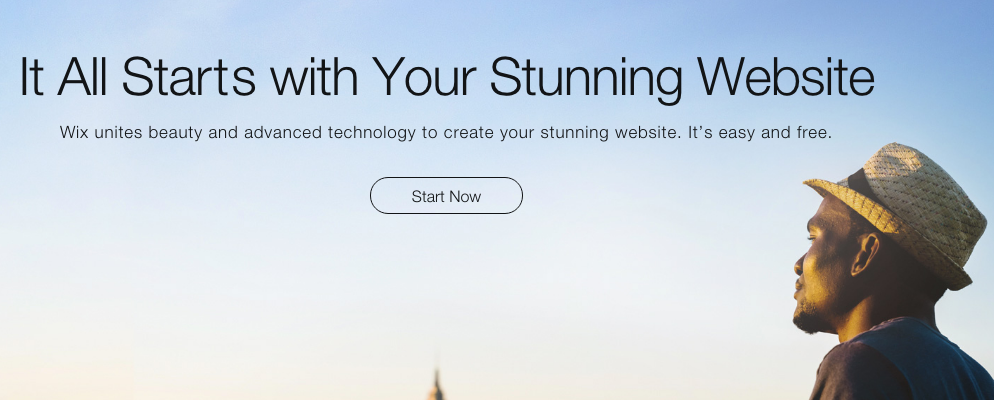
You can think of Wix as a kind of starter area. It's a site creation system that works similarly to training wheels on a bicycle. You know you're never going to win a professional race with training wheels attached to your bike, but you may be happy enough just to know you won't fall over and get hurt.
Wix is available in both free and premium versions. The free version is fine for anyone who doesn't mind including an ad for Wix on their site, and who doesn't care about their domain name too much. It's interesting, in fact, that Wix actually uses the domain name factor as a persuader for upgrading from their free plan to a premium plan. They state that having your own domain name “gives your business credibility and professionalism.” This implies that the inverse is true: having a “yourname.wix.com” domain reduces the credibility and professionalism of your business. I don't know if either of these statements is entirely correct, but it's certainly food for thought.
The lowest tier of premium plan which does not involve displaying ads for Wix is currently priced at $8.25 per month, which amounts to an annual cost of $99. It's stated that this plan is intended for “personal use”, but it's not clear whether using it to host a business site is not permitted or just not recommended. We presume it's the latter case. That plan is actually fairly generous. It comes with a massive 3GB of storage space, which is more than enough for a typical site, even one where a noob client is storing their photos at the same resolution their camera created them in. The 2GB of bandwidth is also adequate for most sites at this level. There are many things that will make this plan unattractive to some clients, though, such as the lack of e-Commerce features, which requires an investment of $16.17 per month.
One of the even more interesting things about Wix is their VAT policy, which states that their prices don't include VAT and that the VAT will be determined based upon the user's billing country. This is extremely interesting because most businesses charge VAT based on the location of their business, not yours. In fact, you're supposed to get VAT or GST eliminated from the cost if you're an “export” buyer.
But where it gets even more interesting is in the potential for having your billing country different to your country of residence, so in this way you might be advantaged or disadvantaged by the VAT policy. It's actually highly unusual to use the billing country as the basis for determining VAT. The way it is supposed to work is if your company and theirs are in the same taxation territory, you pay VAT, and if not, you usually don't. This policy basically gives Wix a worldwide tax collector role, which really isn't something they should want.
Wix uses templates to assist users to quickly create sites in a huge number of categories. It's similar in some respects to RV Site Builder, but arguably a lot simpler, and with a bigger range of existing templates to make use of. Real professionals, if they even agree to work in Wix at all, will most likely steer clear of the templates because they have a reputation to uphold.
The drag-and-drop nature of Wix site editing means development time should be cut significantly. But all this wizadry will obviously come with a loss of freedom. Your site will be locked down to Wix and it's actually very difficult to directly transfer a Wix site to another host. There are a few other frustrations present, but whether or not they would affect you depends on what your intentions are.
One of the biggest drawbacks to Wix sites is in terms of SEO, even though they reportedly offer a feature called “SEO Wizard”. Why don't generic web searches find top ranked listings that include a Wix domain, unless you're searching for terms like “build a website for free”? The answer seems obvious.
The truth is that while Wix gives the impression that anyone can build a website using Wix and that Wix templates can meet the needs of any business, these are not realistic impressions. A trained, experienced web designer may be able to create a working website in Wix more quickly than using traditional approaches, but will probably build that site entirely from a blank template and with no illusions as to how limited the site that emerges from this process will be.
That professional will have a good idea of their client's needs and will know there is not much chance of the client needing to expand greatly in the future (or if so, they'll already have developed a strategy to handle that situation, which involves rebuilding the site outside of the Wix environment). If the designer is honest, the resulting Wix website will be cheaper to purchase than an equivalent site created in WordPress, simply because it's a drag-and-drop process to build it with practically no need for doing any coding or advanced tweaking.
Breakdown:
Time to completion 1 day to 2 days
Design fees $100 to $500
Theme cost $0 to $0
Programming costs $0 to $100
Hosting & Registration $0 to $309
Sub-Total $100 to $909
Total $1,325 to $6,659
Comparison Table
| Rank | Site name | Price | Fees | Free Trial | PCI Compliant | Rating | Visit Site | |
|---|---|---|---|---|---|---|---|---|
| 1 | Shopify | $29 | 2% | 14 days | YES | 5/5 | Visit Site | |
| 2 | Volusion | $15 | None | 14 days | YES | 4.5/5 | Visit Site | |
| 3 | BigCommerce | $31 | 2% | 15 days | YES | 4.5/5 | Visit Site | |
| 4 | WIX | $16.17 | 2.5% | 14 days | YES | 4.2/5 | Visit Site | |
| 5 | Web.com | $6.95 | None | 14 days | YES | 3.9/5 | Visit Site | |
| 6 | 3dCart | $29.95 | None | 14 days | YES | 3.7/5 | Visit Site | |
| 7 | Pinnacle Cart | $23 | None | 14 days | YES | 3.2/5 | Visit Site | |
| 8 | Squarespace | $8 | None | 14 days | YES | 3.1/5 | Visit Site | |
| 9 | Yahoo | $10.95 | 1.5% | NO | YES | 2.8/5 | Visit Site |
Which one is right for your client? Well, then answer is (as usual): it depends. If your client doesn't need to self-manage the site or has some coding skills (or employees with coding skills) then a fully custom site is the way to go. This is also true for sites that are not likely to undergo constant change. For sites where self-management is really important, where the people who will be working on the site are not highly skilled, or where the site needs very frequent updating, WordPress may be a better option.




You have provided very accurate and correct information, thank you sincerely,
You’re welcome Pankaj!
Very nice sir
Thank you!